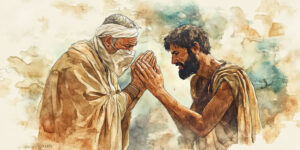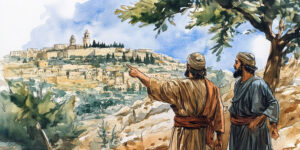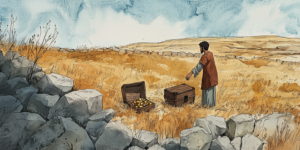
The Tree of Life OR?
Eden wasn’t just beautiful—it was ideal. God created it as a place for Adam and Eve to live in perfect harmony with each other, and with Him. But there was
He went on his way through towns and villages, teaching and journeying toward Jerusalem. And someone said to him, “Lord, will those who are saved be few?” And he said to them, “Strive to enter through the narrow door. For many, I tell you, will seek to enter and will not be able. When once the master of the house has risen and shut the door, and you begin to stand outside and to knock at the door, saying, ‘Lord, open to us,’ then he will answer you, ‘I do not know where you come from.’ Then you will begin to say, ‘We ate and drank in your presence, and you taught in our streets.’ But he will say, ‘I tell you, I do not know where you come from. Depart from me, all you workers of evil!’
In that place there will be weeping and gnashing of teeth, when you see Abraham and Isaac and Jacob and all the prophets in the kingdom of God but you yourselves cast out. And people will come from east and west, and from north and south, and recline at table in the kingdom of God. And behold, some are last who will be first, and some are first who will be last.”Luke 13:22-30
As Jesus purposefully made His way to Jerusalem, He understood that His journey would culminate in His suffering, death, resurrection, and ultimately, His ascension. He knew that before He could return to His rightful place in heaven, He had to endure betrayal, mockery, and immense pain. Yet, He pressed forward with unwavering determination, demonstrating His boundless love and commitment to fulfilling God’s plan for salvation.
During His journey, Jesus was approached with a question that reflected a common theological debate of the time: “Will only a few be saved?” (Luke 13:23). The Jewish people, particularly the Pharisees and Sadducees, often debated the number of those who would inherit eternal life. However, rather than engaging in a theoretical discussion, Jesus shifted the focus to a personal challenge: “Strive to enter through the narrow gate” (Luke 13:24).
Jesus’ response emphasized that salvation is not about statistics or group identity—it is about personal faith and commitment. He warned that many would seek to enter the kingdom of God but would not be able. The imagery of the narrow gate serves as a metaphor for the path of true discipleship. It is not an easy road; it requires effort, commitment, and a willingness to follow Jesus wholeheartedly.
In contrast, the broad road—the path most people choose—is one of ease, comfort, and conformity to worldly values. It is filled with distractions and false promises of happiness. The wide gate represents a life lived apart from God, one that ultimately leads to destruction (Matthew 7:13-14). Jesus made it clear that following Him requires sacrifice, self-denial, and a willingness to go against the cultural tide.
In Jesus’ time, many Jews assumed that their heritage as descendants of Abraham guaranteed their place in God’s kingdom. However, Jesus shattered this misconception by stating that entry into the kingdom was not based on lineage but on personal faith. He illustrated this with the sobering image of a closed door: “Once the master of the house has risen and shut the door, and you begin to stand outside and knock, saying, ‘Lord, open to us,’ then he will answer you, ‘I do not know where you come from’” (Luke 13:25).
This is a stark reminder that proximity to religious activities, traditions, or even good works does not equate to a relationship with Christ. Many people today identify as Christians by association—attending church, engaging in acts of charity, or following Christian traditions—without truly knowing Jesus personally. But when the final judgment comes, only those who have genuinely placed their faith in Him and followed Him in obedience will enter the kingdom.
Jesus’ warning about the narrow gate also carries an urgent message: the opportunity for salvation will not always be available. The door will eventually close. This is a sobering truth that should prompt deep reflection. Many put off their decision to follow Christ, assuming they have plenty of time. But the reality is that none of us know how long we have. Jesus calls us to respond now, not later.
This urgency is not meant to invoke fear but to emphasize the incredible opportunity before us. Why delay experiencing the fullness of God’s grace and love? Why put off entering into a relationship that offers true peace, joy, and purpose?
Following Jesus means surrendering our personal ambitions, comforts, and even cultural expectations when they conflict with His calling. Jesus encountered individuals who hesitated in their commitment. One man wanted to follow Him but was unwilling to give up his comfort. Another wanted to first fulfill cultural obligations before committing to discipleship. Jesus’ response was clear: “No one who puts his hand to the plow and looks back is fit for the kingdom of God” (Luke 9:62).
In today’s world, many face similar dilemmas. Some hesitate to follow Christ fully because of societal pressures, career aspirations, or personal relationships. But Jesus calls for an undivided heart. He assures us that what we gain in Him far surpasses anything we may give up.
Ultimately, Jesus’ call to enter through the narrow gate is an invitation to know Him personally. He does not desire mere religious observance—He seeks a relationship. When we truly know Jesus, our priorities shift. He becomes our greatest treasure, our source of strength, and the foundation of our lives.
So, the question remains: Are you walking through the narrow gate? Are you striving to know Jesus, or are you merely going through the motions? Don’t wait until the door closes. Respond to His call today, and experience the abundant life He offers.

Eden wasn’t just beautiful—it was ideal. God created it as a place for Adam and Eve to live in perfect harmony with each other, and with Him. But there was

In Luke 17, we find an episode in Jesus’ ministry that is both deeply profound and incredibly relevant to our lives today…

The Bible is filled with deep irony, and one of the most profound examples occurs as Jesus prepares for His final journey to Jerusalem. Just as He transformed the Passover

Faith is not merely spoken; it is demonstrated. Baptism is an act of obedience, a public declaration of our faith in Jesus Christ.

Through the parables of the hidden treasure and the pearl of great price, Jesus communicates a powerful truth: discovering the kingdom of God is worth more than anything else in